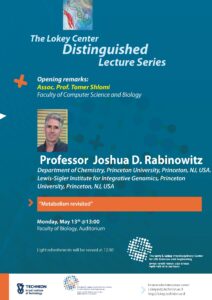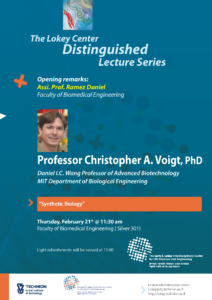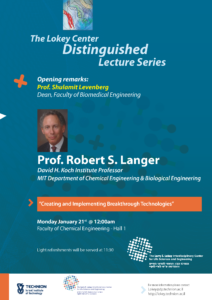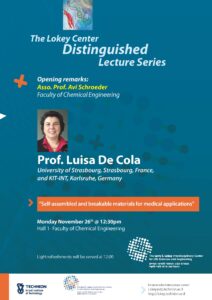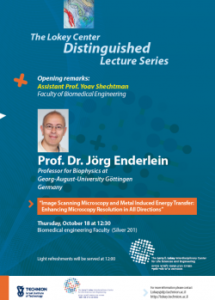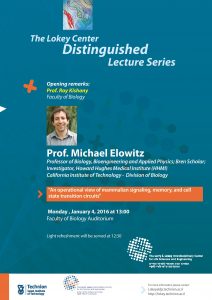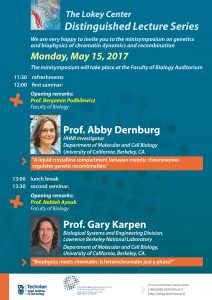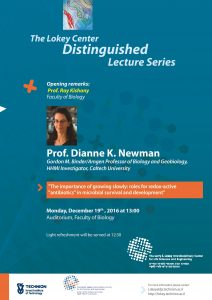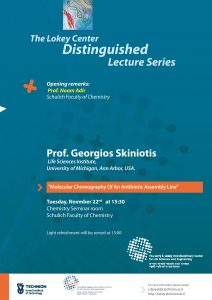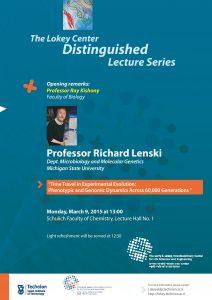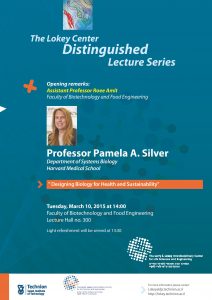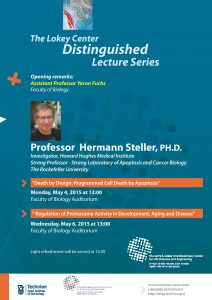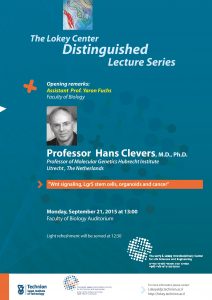Lecture of Prof. Joshua D. Rabinowitz
(May 13, 2019)
Joshua D. Rabinowitz is a Professor in the Department of Chemistry, Lewis-Sigler Institute for Integrative Genomics, and the Department of Molecular Biology at Princeton University. Rabinowitz obtained his bachelor’s degree in Chemistry and Mathematics from the University of North Carolina at Chapel Hill (1994) and a PhD in Biophysics (1999) and M.D. (2001) from Stanford University.
Prof Rabinowitz is a widely recognized and cited researcher in the field of Metabolism and System Biology. His research led to important discoveries on metabolic regulation and metabolic dysfunction in tumors. Rabinowitz has published over 200 papers, including many in the highest impact journals (Nature, Science, PNAS, etc.). Rabinowitz received the NIH Pioneer Award in 2016.
Lecture of Prof. Christopher A. Voigt
(February 21, 2019)
Christopher A. Voigt is a Professor of Biological Engineering at the Massachusetts Institute of Technology (MIT), co-Director of the MIT Synthetic Biology Center and founder of the MIT-Broad Foundry. Voigt obtained his bachelor’s degree in Chemical Engineering from the University of Michigan, Ann Arbor (1998) and a PhD in Biochemistry and Biophysics from the California Institute of Technology (2002). Voigt completed his postdoctoral research in Bioengineering at the University of California, Berkeley. His academic faculty career commenced as an Assistant and Associate Professor at the Department of Pharmaceutical Chemistry at the University of California-San Francisco, after which he joined the Department of Biological Engineering at MIT as Associate Professor in 2011.
Prof Voigt holds adjunct faculty positions at UCSF and the Korea Advanced Institute of Science and Technology; is an associate member of the Broad Institute; is an honorary fellow of Imperial College, UK; and a chemical scientist faculty member at the Lawrence Berkeley National Labs. He established and is the inaugural editor-in-chief of the journal ACS Synthetic Biology and is the founder and chair of the SEED Conference Series (Synthetic Biology, Engineering, Evolution & Design).
Prof Voigt is a widely recognized and cited researcher in the field of Synthetic and System Biology. His research led to the development of the first programming language for cells, which formed the basis for his recently published and publicly available computer-aided design tool, Cello. Voigt has published over 55 papers, an astonishing one-third of which have been published in the highest impact journals (Nature, Science, PNAS). Among Voigt’s honors and awards are 2015 National Security Science and Engineering Faculty Fellowship (OSD), Scientific American’s World Changing Ideas (2015), “Top 10 Technologies of 2009” (The Scientist); Packard Fellow (2007-2012); MIT Technology Review 35 (2006); NSF CAREER Award (2006-2011), Pew Scholar (2006-2009) and a Sloan Research Fellowship (2005)
Lecture of Prof. Robert Langer
(January 21, 2019)
It was our pleasure to host Prof. Robert and listen to his talk about “Creating and Implementing Breakthrough Technologies”.
Robert Langer is an institute professor at MIT, at the Department of Chemical Engineering and the Department of Biological Engineering. He is also a faculty member of the Harvard-MIT division of health science and Technology and the David Koch institute for integrative cancer research.
Prof Langer is a widely recognized and cited researcher especially in the fields of drug delivery systems and tissue engineering. He is the most cited engineer in history. Langer’s research laboratory at MIT is the largest Biomedical engineering lab in the world; maintaining over $10 million in annual grants and over 100 researchers. He is an extremely creative innovator and has been involved in the founding of many companies.
Prof Langer received both the U.S. National Medal of Science and the National Medal of Technology and Innovation. He also received the Queen Elizabeth prize for Engineering, the most influential prize in the world for engineering. He has received numerous other awards including (In Israel): the Harvey Prize in Science & Technology and Human Health, the Dan David prize and the Wolf Prize.
Lecture of Prof. Luisa De Cola
(November 26, 2018)
Prof. Luisa De Cola is Full Professor (Class Exceptionnelle), AXA chair of Supra-molecular and Biomaterial Chemistry, at ISIS, University of Strasbourg and CNRS, France. Among her many awards and positions She is Member of the Academia European, Recived the Republic of France Medal de la Légion d’Honneur, she is member of the German Academy of Sciences, Recipient of the Chemistry Medal (Tartufari Prize) of the Republic of Italy, she is also Member of the “l’Institut Universitaire de France”.
The title of her talk: "Self-assembled and breakable materials for medical applications"
Lecture of Prof. Jörg Enderlein
(October 18, 2018)
Jörg Enderlein is a Professor of biophysics in Georg August University, Göttingen, Germany. The title of his talk: “Image Scanning Microscopy and Metal Induced Energy Transfer: Enhancing Microscopy Resolution in All Directions”
He is an extremely creative innovator in the field of single molecule spectroscopy/microscopy, and has been active in the development of many far-field and near-field methods for optical super-resolution microscopy, including: super-resolution optical fluctuation imaging (SOFI), dual-focus fluorescence correlation spectroscopy (2fFCS), fluorescence lifetime correlation spectroscopy (FLCS), defocused image analysis of single molecules (DIAM), Image-Scanning-Microscopy (ISM), Metal Induced Energy Transfer (MIET), and more.
Lecture of Prof. Michael Elowitz
Prof. Michael Elowitz from California Institute of Technology visited the Technion and talked about: “An operational view of mammalian signaling, memory, and cell state transition circuits.” Dr. Elowitz pioneered brilliant new methodologies and approaches to the fundamental problem of understanding cellular function, opening up whole new ways of thinking about biological questions, which shattered the foundations of cellular dynamics, and lead to the development of two new fields: Single-Cell Stochasticity and Synthetic Biology. Prof. Elowitz is an HHMI Investigator and Professor of Biology, Biological Engineering, and Applied Physics at Caltech and is the Executive Officer for Biological Engineering. His work has been recognized by the Burroughs Wellcome Career Award, the Packard Foundation fellowship, the Searle Foundation fellowships, Discover Magazine “Top 20 under 40,” the Technology Review magazine TR100 top innovators, the Macarthur fellowship, and the HFSP Nakasone Award.
Lecture of Prof. Abby Dernburg and Prof. Karpen
(May 15 2017)
We held a mini-symposium on “Genetics and Biophysics of Chromatin Dynamics and Recombination” delivered by Prof Abby Dernburg from the Department of Molecular and Cell Biology at University of California, Berkeley, CA and Prof. Gary Karpen from the Department of Molecular and Cell Biology, University of California, Berkeley, CA.
Prof. Dernburg talked about “A liquid crystalline compartment between meiotic chromosomes regulates genetic recombination.” Prof. Dernburg did her Ph.D. with John Sedat at the University of California in San Francisco; Dernburg explored diverse aspects of chromosome biology in Drosophila, leading to major discoveries in the field including special regions of each chromosome, called pairing centers, that help the homologous chromosomes recognize one another. Prof. Dernburg pursued her efforts in developing high-resolution cytological tools to study meiotic chromosomes behavior during her post-doctoral work on C. elegans in Anne Villeneuve’s lab at Stanford. Next, Prof. Dernburg established her own lab in Berkeley and continued to investigate how chromosomes find and synapse with their homologs during meiosis by combining high-resolution imaging of chromosomes in situ and in vivo with the molecular genetic advantages of C. elegans. As a recognition of her outstanding contribution to science, Prof. Dernburg received the Scholar Award in 2006, the Edward Novitski Prize in Genetics in 2011 and was selected as HHMI Investigator in 2008. She is also a member of the “Genetics Society of America” and the “American Society for Cell Biology”
Prof. Karpen talked about “Biophysics meets chromatin: Is heterochromatin just a phase?” Prof. Karpen obtained his Ph.D. in Genetics in 1987, where he worked on the role of nucleolus organization on rDNA function in Drosophila in the lab of Charles Laird at Washington University. He continued to work with Drosophila during his postdoc in the lab of Allan Spradling at the Carnegie Institute. Prof. Karpen started his own lab at the Salk Institute, La Jolla in 1991. After being in San Diego for 12 years, during which he obtained his professorship at The Salk Institute for Biological Studies, he moved to the Lawrence Berkeley National Lab (LBNL) in 2003. Prof. Karpen became director of the LBNL Life Sciences Division in 2011. The Karpen lab has a long-standing interest in chromatin structure and function, with a special emphasis on heterochromatic DNA regions. The current projects in the lab range from centromere formation and function, to the role of lncRNAs, ageing, and DNA repair in heterochromatin formation and maintenance. Prof. Karpen’s discoveries were published in top journals and earned him many prestigious awards and honors.
Lecture of Prof. Dianne Newman
Prof. Dianne Newman from Caltech University gave a talk entitled: “The importance of growing slowly: roles for redox-active ‘antibiotics’ in microbial survival and development.” Dr. Dianne Newman’s research focuses on microbial stress responses, with an emphasis on mechanisms of energy generation and survival when oxygen is scarce. The contexts that motivate her research span ancient sedimentary deposits to chronic infections yet are linked by similar physiological questions. Dr. Newman earned her PhD in Environmental Engineering at MIT with Francois Morel, a geochemist, and trained as a postdoc at Harvard Medical School with Roberto Kolter, a bacterial geneticist.
Lecture of Prof. Anatoly Kolomeisky
Prof. Anatoly Kolomeisky from the Department of Chemistry, Rice University, TX, USA gave a talk about “How to Understand the Formation of Signaling Profiles in Biological Development” Prof. Kolomeisky is a recipient of multiple awards, including Dreyfus New Faculty Award, Sloan Fellowship, NSF CAREER, and Humboldt Research Fellowship. He was recently elected as a Fellow of American Physical Society. Prof. Kolomeisky is working in the area of Statistical Mechanics, Theoretical Physical Chemistry and Theoretical Biophysics. More specifically, he is trying to understand the microscopic mechanisms of complex chemical and biological processes, including motor proteins, biomolecular and artificial nanomachines, cytoskeleton protein dynamics, biological signaling, protein-DNA interactions, enzymatic processes, transport through channels and fluorescent proteins.”
Lecture of Prof. Georgios Skiniotis
Prof. Georgios Skiniotis of the University of Michigan, Ann Arbor, USA, talked about “Molecular Choreography Of An Antibiotic Assembly Line.” Prof. Skiniotis expertise is in the application of high resolution molecular electron microscopy techniques (cryo-EM and negative stain EM) for the 3D structural characterization of complex and dynamic protein assemblies, methodologies that have revolutionized structural biology. His experimental approach is based on the application of hybrid methodologies, primarily involving biochemistry, single-particle EM, molecular modeling, and more recently molecular dynamics simulations. Recent projects in his lab are the structural biology of signaling cell surface receptors and the mechanisms that govern transmembrane signal instigation, with a main focus on cytokine receptors and G protein coupled receptor (GPCR) complexes . His lab is developing experimental approaches for the structural analysis of other biologically significant complexes, such as chromatin modifiers and ribosomes from human pathogens.
Lecture of Prof. Michael Elowitz
Prof. Michael Elowitz, a biologist and professor of Biology, Bioengineering, and Applied Physics at the California Institute of Technology and investigator at the Howard Hughes Medical Institute, talked about his studies These include: dynamics of genetic circuits in individual living cells, using synthetic biology; time-lapse microscopy, and mathematical modeling, with a particular focus on the way in which cells make use of noise to implement behaviors that would be difficult or impossible without it. Recently, his lab has expanded its approaches beyond bacteria, to include eukaryotic and mammalian cells.
Lecture of Prof. Richard Lenski
Prof. Richard Lenski gave a talk entitled: “Time Travel in Experimental Evolution: Phenotypic and Genomic Dynamics Across 60,000 Generations” The E. coli long-term evolution experiment is an ongoing study in experimental evolution led by Richard Lenski that has been tracking genetic changes in 12 initially identical populations of asexual Escherichia coli bacteria, since February 24th, 1988. Since the experiment's inception, Lenski and his colleagues have reported a wide array of genetic changes; some evolutionary adaptations have occurred in all 12 populations, while others have only appeared in one or a few populations. One particularly striking adaptation was the evolution of a strain of E. coli that was able to use citrate as a carbon source in an aerobic environment.
Lecture of Prof. Pamela Silver
Prof. Pamela Silver, one of the founders of the emerging field of Synthetic Biology, visited the Technion in March 2015 and gave a talk entitled: “Designing Biology for Health and Sustainability” Applying synthetic biology to mammalian cells is a new frontier in the field and has a vast number of potential implications for human, animal and plant health, as well as environmental sustainability. Some of Silver’s work in this area includes the engineering of: mammalian cells to remember and report past exposures to drugs and radiation, robust computational circuits in embryonic stem cells and bacteria and synthetic switches to moderate gene silencing with the integration of novel therapeutic proteins.
Lecture of Prof. Alfred L. Goldberg and Prof. Michael Sherman
On June 7th, 2015, we held a mini-symposium in honor of Distinguished Profs Alfred L. Goldberg and Michael Sherman, on “Mechanisms of Protein Misfolding and Degradation in Disease”. Prof. Alfred Goldberg of Harvard Medical School is one of the world’s leading experts on protein degradation mechanisms via the ubiquitinproteasome system. He made several scientific breakthroughs, among them is the discovery of ATP-dependent proteases and proteasomes. In his lecture at the Technion on June 7th this year, Prof. Goldberg described how he discovered the 26S proteasome and developed proteasome inhibitors, which are widely used as research tools (i.e. MG-132) and in cancer therapy (i.e. Bortezomib). In addition, he demonstrated several new biochemical mechanisms and critical physiological regulation of protein breakdown in human disease.
Prof. Michael Sherman of Boston University conducted his postdoc with Prof. Goldberg. His work made breakthroughs in our understanding of how proteolytic systems specifically recognize and degrade abnormal, misfolded and aggregated proteins. In his lecture, Prof. Sherman introduced the specific roles of Hsp70 chaperons in cancer development, and presented new promising small molecule inhibitors of Hsp70 that he developed for the treatment of multiple types of cancer.
Lecture of Prof. Hermann Steller
Prof. Hermann Steller of HHMI/Rockefeller University delivered two talks during his visit to the Technion as a Lokey Distinguished Lecturer Prof. Hermann Steller is one of the leading figures and a pioneer in the field of programmed cell death (apoptosis). His research focuses on the mechanism by which cells undergo apoptosis, how this process is regulated by distinct signaling pathways, and how abnormal regulation of apoptosis contributes to a variety of diseases, including cancer. Many organs and tissues can repair wounds and regenerate cells lost upon injury. Dr. Steller discovered that cells undergoing apoptosis in response to stress or injury can stimulate their own replacement by secreting mitogens to induce proliferation of adjacent progenitor cells. These mitogen pathways have been highly conserved in evolution, and recently, similar phenomena have been observed in mammals, with profound implications for cancer therapy, stem cell biology, and regenerative medicine.
Lecture of Prof. Hans Clevers
Prof. Hans Clevers of Utrecht University visited the Technion in September. He has described the molecular signaling pathways disrupted by cancer and has identified a protein that is specific to stem cells in the intestine. He has then been able to grow ‘miniintestines’ from individual stem cells. These are the first steps on the road to regenerative medicine, in this case the regeneration of intestinal tissue. He also studies the nonlethal use of apoptotic proteins and the ubiquitinproteasome pathway for cellular remodeling. His research deals with the intestine, in both its healthy and diseased state. He has discovered that there are numerous similarities between the normal process whereby intestinal tissue is renewed and the development of intestinal cancer. Improved understanding of these processes is crucial to developing new ways of treating cancer.

